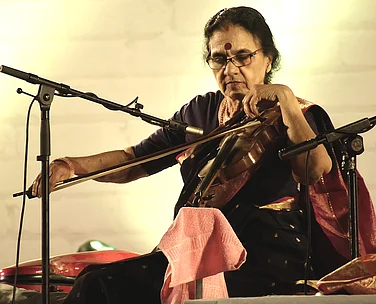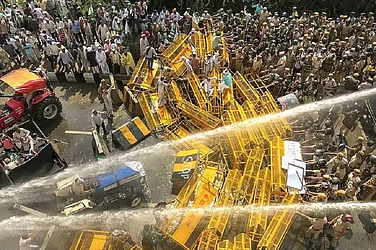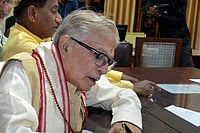Politically complex and mammoth in equal measure, Uttar Pradesh is a crucial passage in Modi’s march to New Delhi. The BJP’s political fortunes in UP depend much on how the Bahujan Samaj Party performs. But the art of poll predictions is made tougher by the enigmatic Mayawati—she keeps the media at an arm’s length, avoids giving interviews and doesn’t encourage journalists to attend her rallies.
If the BJP’s spin doctors are to be believed, Mayawati is losing her hold over the Dalits. Indeed, going by her recent public speeches, she does appear worried over the BJP’s overt wooing of her core constituency. Dalits, Mayawati declared in a statement, were never counted as ‘Hindus’ by the BJP. After the polling is over, she tells her flock, BJP leaders would not even allow Dalits to sit with them. If that betrays a certain nervousness, her partymen are not conceding the point (see box). They stubbornly maintain that the party is about to register its best ever performance in UP.
“Pressure is on Dalits to vote for BJP. The EVM machines record votes in a manner that it is possible to identify which village has voted for which party. Dalits living in hamlets in areas dominated by upper castes will dare not defy their diktat on voting BJP,” claims Shahid Siddiqui, who has been in both the Samajwadi Party and the BSP. Recalling his time in the BSP, Siddiqui tells Outlook how Mayawati would hold monthly meetings with leaders from districts for feedback, and take decisions based on their inputs. Every constituency was studied at length to choose candidates for polls. But with time, grassroot workers’ access to the supremo dwindled. “She is now surrounded by a coterie, who tell her only what she likes to hear, diluting the feedback, and leading to wrong decisions,” Siddiqui says. District-level leaders who once had Mayawati’s ear now get messages through a chain of command. The go-betweens in the BSP, says Siddiqui, have ill-served the party.
Mayawati has fielded 21 Brahmins, 19 Muslims and 14 Rajputs, among other communities, for the Lok Sabha polls in UP. Though the BSP is contesting in scores of constituencies outside UP, the core of its past electoral successes always rested on its fortunes in the state. But she faces an uphill task. Muslims and Brahmins, part of her ingenious sarvajan coalition, are going separate ways in this season of polarisation. In the 2007 assembly elections, the upper castes had voted BSP, but are now have gravitating towards the BJP. Crucially, they claim even Dalits are following in their wake.
After the first round of voting in UP, Muslims reportedly felt their votes for the BSP were in vain, lost amidst a surge in BJP gains, says Ratan Mani Lal, a Lucknow-based journalist. A rethink of strategy had them vote SP in subsequent phases, despite their anger over the Muzaffarnagar riots, he added. Siddiqui, however, describes the Muslim votebank as a myth. “Muslims never vote en masse except out of fear,” he says, adding that this time the SP, BSP and the Congress have all got some Muslim votes.
Surprisingly, every time Mayawati stitched a poll alliance with the BJP, usually followed by an acrimonious split, she managed to strengthen her position subsequently, eating into the saffron outfit’s share. The BJP, too, knows how unpredictable an ally Mayawati could be—her last-minute decision to vote against the NDA in the Lok Sabha in 1999, despite assurances to the contrary, led to the fall of the Vajpayee government.
“In her early years, she sent out the message that nation-building did not include Dalits, tapping into their feeling of being marginalised,” says jnu professor Sudha Pai. Her campaigns—shorn of populism—were disciplined, though she was not a great orator, Pai says. But tensions within the party were never far from the surface. Doling out tickets to Muslims and non-Dalits, however, led to the BSP splitting twice in the past, says Santosh Tripathi, former professor at Kanpur’s DAV College. The BSP likes to boast that Dalits have never deserted it. Yet, whenever the BJP or the SP needed to save their governments by engineering defections from the BSP, they easily succeeded. Loyalty at the party level was fickle.
What sets the BSP apart from other organisations is the lack of a clear line of succession. “Its biggest strength has been its ability to unite most Dalit subcastes under one umbrella,” says Tripathi. With its core constituency intact, Mayawati ventured to woo other communities. “She has managed to break the traditional stranglehold the Congress had over Brahmins, Dalits and Muslims,” he says.
Experts attribute different reasons to the BSP, despite its ambitions outside, being mostly restricted to UP. “Mayawati was not interested in Madhya Pradesh, as she did not want another strong Dalit leader to emerge,” says Pai. Also, states like MP lacked fertile ground for the kind of mobilisation she brought about in UP. Contrary to the general perception of Mayawati wanting to be PM after the polls, Pai says she would rather set her sight on becoming CM again.
“What she does will become clear only after the polls. I think she would be open to an alliance with any political formation,” says Siddiqui. If she does manage to win 30 seats or more, she could well emerge a kingmaker, if not a queen.

























